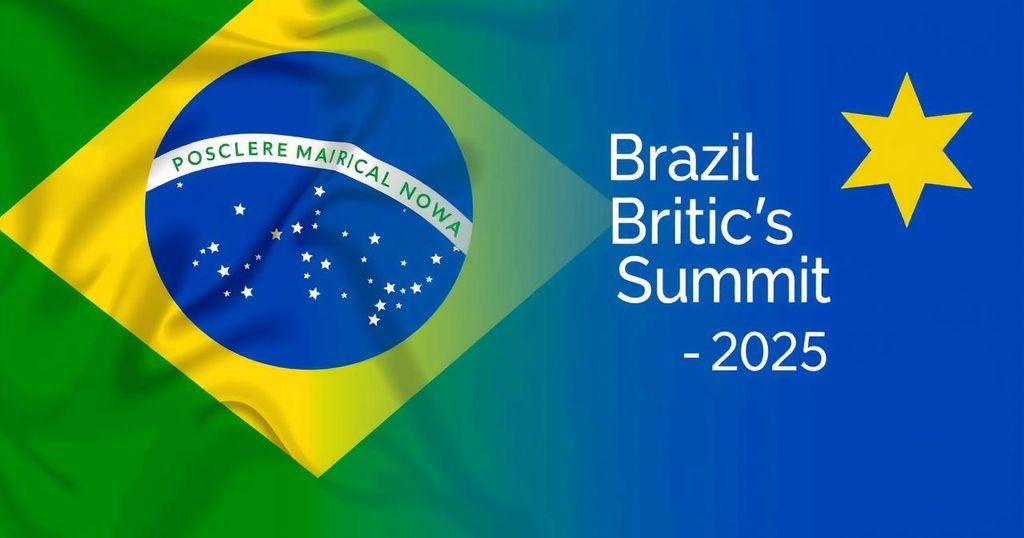Brazil Tries to Maintain Influence Amidst BRICS Expansion

Brazil, despite being a founding member of BRICS, faces a decline in influence as the group expands with the addition of new members like Iran and the UAE. This shift is complicated by Brazil’s historical stance of neutrality, which is challenged by the group’s growing anti-Western sentiments. At a recent summit, Brazil opposed Venezuela’s inclusion, reinforcing its commitment to democratic principles over outdated alliances, even while preparing to assume the presidency of BRICS next year.
Brazil is increasingly facing challenges in maintaining its influence within the BRICS group, particularly as the bloc expands. Despite being the first country in the BRICS acronym, Brazil’s economy is smaller than those of other leading members, such as Russia, China, and India, which diminishes its power. Until now, Brazil benefited from a relatively exclusive group that initially included only South Africa, allowing it to exert significant internal influence. However, the recent expansion, which has seen countries like Egypt, Ethiopia, Iran, and the United Arab Emirates join, threatens Brazil’s position as more potential members line up to join BRICS. China has been a driving force behind this expansion, seeking to enhance its influence through the group. The increased attraction of non-dollar currencies, especially after the imposition of Western sanctions on Russia, has compelled more nations to express interest in joining BRICS. Notably, Cuba and Bolivia are rumored to be among those applying for partnership status. The expansion of BRICS could weaken Brazil’s influence, particularly with nations like Iran that complicate Brazil’s historical stance of neutrality. At the recent BRICS summit in Kazan, Russia, Brazil sought to assert its remaining power by opposing Venezuela’s inclusion as a partner nation. This act marked Brazil’s most assertive diplomatic move against President Nicolás Maduro’s government, with Brazil refusing to recognize Maduro’s recent electoral victory. The Brazilian government believes that supporting gradual democratic change in Venezuela is more aligned with its long-term interests than outdated alliances. Celso Amorim, the chief foreign policy advisor, articulated this sentiment, framing Venezuela’s exclusion as a matter of “broken confidence.” Meanwhile, Brazilian former President Dilma Rousseff received support to continue her role with the BRICS New Development Bank, further enabling Brazil to shape the group’s future priorities. As Brazil prepares to assume its rotating presidency of BRICS next year, it appears to have a crucial opportunity to influence the organization’s direction amid an evolving international landscape that continues to shift the dynamics of power within the group.
BRICS, which includes Brazil, Russia, India, China, and South Africa, has historically been characterized by its exclusivity, offering Brazil a significant influential role as one of the founding members. The recent admission of four new countries into BRICS marks a pivotal change that could alter Brazil’s position within the group. China has spearheaded the expansion efforts, which may potentially diminish Brazil’s voice and sway in decision-making processes. The political climate created by the inclusion of contentious members, particularly Iran, is at odds with Brazil’s desire for a non-aligned stance, further complicating its ability to lead the bloc in a unified direction.
In summary, Brazil stands at a critical juncture within BRICS, grappling with diminished influence as the group expands its membership. The recent BRICS summit exemplified Brazil’s attempts to assert its voice, particularly in opposition to partners it views as problematic, such as Venezuela. Despite the challenges posed by expansion and geopolitical shifts, Brazil’s upcoming presidency provides a strategic window for its leaders to mold the direction of BRICS as they navigate complex international relations.
Original Source: foreignpolicy.com








